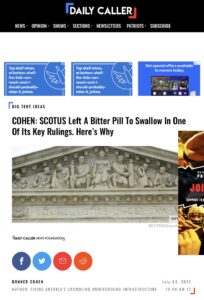
01 Aug 2022 Pen’s Outta Ink, Phone’s Disconnected
Remember when Barack Obama said he could use his pen and phone to push his agenda outside of congressional authority? Remember when Joe Biden spent his first days in office signing stacks of executive orders?
All that may be a thing of the past, thanks to the U.S. Supreme Court.
 “For decades, Congress has delegated its constitutionally prescribed lawmaking authority to unelected and unaccountable bureaucrats ensconced throughout federal regulatory agencies,” wrote National Center Senior Fellow Bonner Cohen, Ph.D. in a Daily Caller commentary. “It has done so by passing vaguely worded laws and then standing idly by while bureaucrats write rules and regulations under those laws.”
“For decades, Congress has delegated its constitutionally prescribed lawmaking authority to unelected and unaccountable bureaucrats ensconced throughout federal regulatory agencies,” wrote National Center Senior Fellow Bonner Cohen, Ph.D. in a Daily Caller commentary. “It has done so by passing vaguely worded laws and then standing idly by while bureaucrats write rules and regulations under those laws.”
Because of the Court, Congress will need to be more involved in actually creating policy again.
In the Court’s decision in West Virginia v. EPA, the justices addressed the “major questions” doctrine that demands the bureaucracy receive explicit authorization from the legislative branch before embarking on major policies. As Bonner explained:
Each rule and regulation promulgated by a federal agency has the force of law behind it, enabling Washington bureaucrats to become de facto lawmakers. In this game, the executive branch usurps powers constitutionally delegated to the legislative branch.
This creates an irresistible temptation to go beyond what Congress may have originally intended; it is irresistible because it puts real power into the hands of otherwise anonymous federal employees. When these predominantly left-leaning career officials have the opportunity to join forces with a White House intent on government-directed transformation of society, little thought is given to such constitutional niceties as the separation of powers.
In his majority opinion, Chief Justice John Roberts wrote: “A decision of such magnitude and consequence rests with Congress itself, or an agency acting pursuant to a clear delegation from that representative body.”
The decision sets precedent that could bring about the rollback of many liberal policies that are advanced with pens and phones. And this, Bonner noted elsewhere, is due to the hard work of President Donald Trump.
But, as important as the West Virginia v. EPA decision is, Bonner said there was a missed opportunity:
The Roberts court could, and should, have overturned the Supreme Court’s 2007 Massachusetts v. EPA decision. That ruling allowed EPA to regulate CO2 as a “pollutant” under the Clean Air Act, even though most atmospheric carbon dioxide is natural and highly beneficial to all forms of life, and even though CO2 is mentioned nowhere in the Clean Air Act.
Click here to read Bonner’s entire Daily Caller commentary – “SCOTUS Left a Bitter Pill to Swallow in One of its Key Rulings. Here’s Why.”




